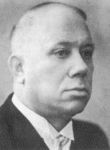- Gerrit Hendrik Kersten
Infobox Politician
name = Gerrit Hendrik Kersten

birth_date = birth date|1882|8|6|mf=y
birth_place =Deventer ,Netherlands
residence =Yerseke ,Rotterdam
death_date = death date and age|1948|9|6|1882|8|6|mf=y
death_place =Waarde ,Netherlands
office = Member of parliament
term_start = 1922
term_end = 1945
office2 = Head ofReformed Political Party
term_start2 = 1918
term_end2 = 1945
predecessor2 = none
successor2 =Pieter Zandt
party = Reformed Political Party
religion =Netherlands Reformed Church
occupation =Minister of religion
spouse = Catharina Adriana Wisse
children = 6 sons, 4 daughtersGerrit Hendrik Kersten (
Deventer ,August 6 ,1882 –Waarde ,September 6 ,1948 ) was a Dutchminister of religion and politician. In 1907, Kersten founded theNetherlands Reformed Congregations . Eleven years later, in 1918, Kersten established theReformed Political Party . He was the party's first representative in theTweede Kamer , after being elected in 1922. He would remain in parliament until 1945.On the evening of
November 10 ,1925 , Kersten, staunchly opposed toRoman Catholicism , proposed an amendment to the 1926 budget for the Ministry for Foreign Affairs. Kersten's proposal came down to ending financial support for a Dutch office at theHoly See . The amendment was adopted the next day, with support from government partyChristian Historical Union . This led to the resignation of four catholic government ministers and the fall of the first government ofHendrik Colijn . The fall of the cabinet became known as theNight of Kersten .Kersten was a staunch critic of the policies of Colijn. The speaker of the Dutch parliament had parts of Kersten's contributions to debates edited in the Proceedings no less than thirteen times between 1922 and 1940.
During the Second World War, Kersten denounced resistance against the Nazis, claiming they were sent by God as punishment for desecration of the Sunday. He also refused to sign a 1941 protest of the convent of Dutch churches against the persecution of Jews during the war. However, Kersten aided the dutch underground which shipped Jews from Rotterdam to safe houses in southern Holland. He did not receive credit for his humanitarian actions following WW II. After the end of the war, a government committee barred him from parliament. He focussed on writing theological works. Kersten died three years later, in 1948.
Wikimedia Foundation. 2010.
